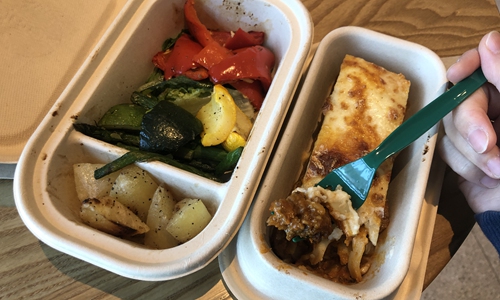Starbucks, KFC eyeing China’s meat substitutes market to beef up profits amid coronavirus
By Zhang Dan Source:Global Times Published: 2020/4/22 16:05:18
Starbucks, KFC eyeing China’s meat substitutes market to beef up profits

Plant-based beef lasagna at a Starbucks store in Chaoyang District, Beijing on Wednesday Photo: Zhang Hongpei/GT
Starbucks has started to sell meat substitutes in its China outlets on Wednesday, in a bid to explore the alternative meat market in the world's second-largest economy.
The US coffee chain has reopened most of its stores in China as the coronavirus has begun to recede in the country. However, experts warned that the industry lacks regulating standards, and the high price of meat substitute products will hinder their market prospects in China.
The new Starbucks menu features Beyond Meat, one of the US' largest producers of meat substitutes, marking the company's official entry into the Chinese market where such food products are still novel to consumers.
The new Starbucks offerings include lasagna, pasta and tortilla wraps which contain Beyond Meat "beef," two dishes with pork alternatives from Hong Kong-based OmniPork, and a dairy-substitute oat milk from Oatly.
A Beijing-based white-collar worker surnamed Jia ordered a "beef" lasagna at the price of 69 yuan ($9.74) in a Starbucks branch on Wednesday. "The taste is like real meat, and it is good. It is convenient for me to order something like this on work days when I don't have a lot of time to enjoy the flavor," he told the Global Times.
An employee at a Starbucks outlet in Beijing's Chaoyang District told the Global Times on Wednesday that they had sold 20 of the new meat dishes in the morning as consumers wanted to try the fresh food.
However, netizens on Chinese social media are airing different opinions. Some doubted the flavor and commented that they would rather pay the same price to eat genuine meat.
According to a survey by KNews under the Shanghai Media Group on China's Twitter-like Weibo, only 560 people were eager to try the meat alternatives among 2300 surveyed as of press time.
The US coffee giant has reopened more than 95 percent of its cafes in the Chinese mainland where it has more than 4,300 outlets, the company confirmed with the Global Times on Wednesday, following temporary suspension to slow the spread of the coronavirus. Most of its stores in the Chinese mainland started to sell the meat alternatives on Wednesday.
"Beyond Meat's entrance into the Chinese marketplace will contribute to the overall growth of the sector, helping to further solidify China's progress as it sets the standard in sustainable food systems," according to a statement on Beyond Meat's Chinese website, which underscored the significance of the Chinese market.
It is notable that Starbucks is not the only foreign brand showing interest in China's fake meat market. Fast food chain KFC under Yum China Holdings Inc is also set to launch its own meat alternative products - fried "chicken nuggets" made with vegetable protein. Priced at 1.99 yuan (28 cents) for five pieces, the product will be sold in Shanghai, Guangzhou and Shenzhen from April 28.
Chinese meat substitute stocks rose high on Wednesday. The stock price of Chinese pea protein company Yantai Shuangta Food had rallied as high as 10 percent when market closed. The company has an indirect supply connection with the KFC "chicken nuggets" as the nuggets use Shuangta Food pea protein, according to media reports.
"Starbucks and KFC launched new products at this moment in order to stimulate consumers' confidence and get more attention after the coronavirus situation improved in the country," Zhu Yi, an associate professor of food security and nutrition at China Agricultural University in Beijing, told the Global Times on Wednesday.
However, Zhu noted that Chinese consumers' interests in meat substitute products won't last long.
"The rolling out of meat substitute products in Chinese market is some foreign brands' wishful thinking, instead of the true demand of Chinese consumers," She said, adding that only young consumers in China would prefer novel products and be eager to new experience.
High price of meat substitute products will hinder their market prospects in China, according to Zhu.
The price of tortilla wrap with real meat is about 39 yuan, while the price of newly-released meat substitute has jumped to 59 yuan.
On April 8, Starbucks President and CEO Kevin Johnson and Chief Financial Officer Patrick Grismer published an open letter to the company's stakeholders, announcing that comparable-store sales in China declined by 64 percent in March - an improvement compared to the 78 percent decline in comparable-store sales in February.
Overall, the company estimated that China comparable-store sales will fall 50 percent in the fiscal second quarter.
Zhu Danpeng, a veteran food industry analyst, told the Global Times on Wednesday that, driven by inflowing capital and industry development, more firms are expected to join the fake meat league to test the waters, although the plant-based meat sector is still in its early stages. "It will become the next lucrative battleground."
"The meat substitutes have their own advantages in realizing steady scale supply and fending off risks from diseases that hurt the meat industry like African swine fever," said Zhu.
However, there are still risks and doubts over whether meat alternatives are absolutely safe, since both foreign countries and China have not rolled out industry standards, according to Zhu.
Posted in: COMPANIES